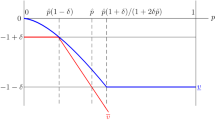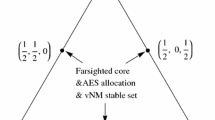Abstract.
The interaction between social activists and politicians is modeled by a signaling game in which activists send messages and politicians interpret them, attempting to understand the activists' goals. These goals range between extreme radical and very moderate changes that activists wish to achieve in policy or in the political system. The formal model shows the conditions for equilibrium with separating and pooling regions dependent on the type of social activists and the demands they raise. In the pooling region an activist who wants to achieve a certain degree of radical change sends a false signal, thus possibly leading politicians to enter negotiations under unfavorable conditions. This creates a momentum of peaceful political change.
Similar content being viewed by others
Author information
Authors and Affiliations
Additional information
Received: 19 February 2001/Accepted: 6 February 2002
Rights and permissions
About this article
Cite this article
Gavious, A., Mizrahi, S. A signaling model of peaceful political change. Soc Choice Welfare 20, 119–136 (2003). https://doi.org/10.1007/s003550200171
Issue Date:
DOI: https://doi.org/10.1007/s003550200171




